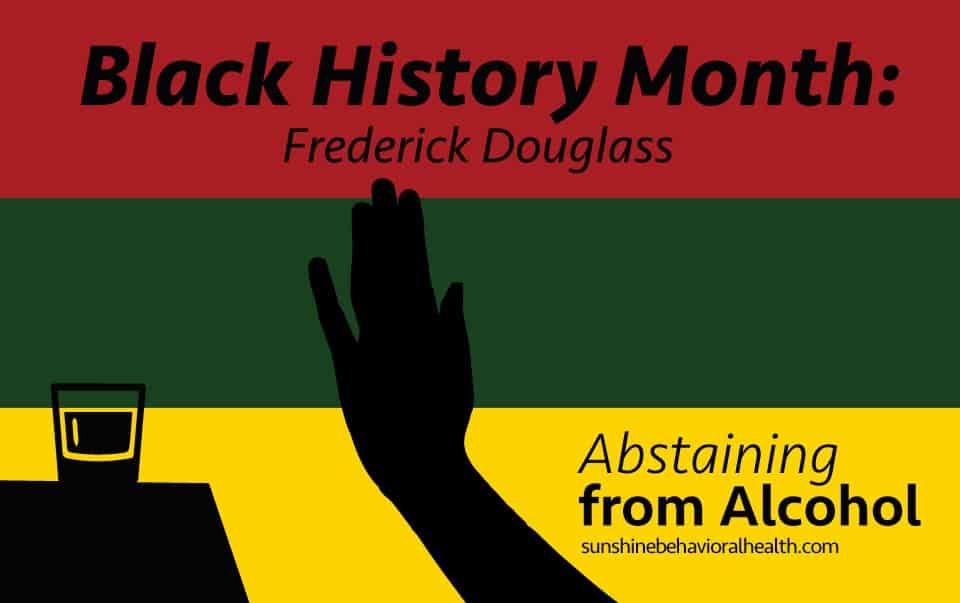
Frederick Douglass Spoke for Freedom, Equality — and Abstaining from Alcohol
Frederick Douglass is well known for being an abolitionist, a supporter of the suffragist movement, and for being a powerful writer and accomplished speaker. He was also known for championing temperance, or abstinence from alcohol. Douglass experienced indescribable cruelties as a slave — separation from his mother and his grandparents as well as brutal beatings. While still a child, he spent some years in Baltimore where he was treated more humanely and covertly learned to read. Later he was hired out to a farm where he was whipped and starved, he later said the experience left him “broken in body, soul, and spirit.” The seeds were planted, however, and Douglass read and absorbed as much knowledge as he could, eventually using the skill to write and speak for freedom and equality. He knew all too well the bondage of shackles and chains, but he also understood how binding an addiction could be.A Voice for Freedom and Temperance
Frederick Douglass wrote and spoke for temperance (and abolishing slavery, both in the United States and abroad) in the years after he escaped from slavery. In 1846 he addressed audiences at the World Temperance Convention in London and at a protemperance and antislavery gathering in Paisley, Scotland. Douglass’s efforts to speak in support of temperance in the United States were met with hostility, due to his race. In addition to his work, Douglass understood the dangerous allure of alcohol firsthand: “I have had some experience of intemperance as well as of slavery,” he wrote. “In the Southern States, masters induce their slaves to drink whisky, in order to keep them from devising ways and means by which to obtain their freedom. In order to make a man a slave, it is necessary to silence or drown his mind. … On Saturday evening, it is the custom of the slaveholder to give his slaves drink, and why? Because if they had time to think, if left to reflection on the Sabbath day, they might devise means by which to obtain their liberty. “I knew once what it was to drink with all the ardour of old soker,” Douglass continues. “I lived with a Mr. Freeland who used to give his slaves apple brandy. Some of the slaves were not able to drink their own share, but I was able to drink my own and theirs too. I took it because it made me feel I was a great man. “The blacks are to a considerable extent intemperate, and if intemperate, of course vicious in other respects, and this is counted against them as a reason why their emancipation should not take place. As I desire, therefore, their freedom from physical chains, so I desire their emancipation from intemperance, because I believe it would be the means — a great and glorious means — towards helping to break their physical chains and letting them go free.”Not a Moral Failing
Addiction to drugs and alcohol has long been — and still often is — seen as a moral failing or a lack of willpower. It’s not, however. Substance use disorder is now recognized as a mental illness, one that changes normal behaviors and disrupts daily life but one that can also respond to treatment. Frederick Douglass knew firsthand the struggles of alcohol abuse, a challenge that still plagues millions of Americans. In 2012, the National Survey on Drug Use and Health estimated that 22.2 million Americans ages 12 and up had abused substances or were dependent on substances within the previous year. Tamika C. B. Zapolski, Ph.D., has studied substance use and abuse among people of color at Indiana University-Purdue University Indianapolis (IUPUI). Zapolski and other researchers at her PRISM (Prevention Research In Substance Use and Minority Health) Lab have found that African Americans tend to drink less and experience less alcohol dependence, but the problems that result tend to be more severe, including abusing two or more substances at once (polydrug use). Improper use of multiple drugs can be highly dangerous. Approximately half of all emergency room visits for prescription drug abuse involved dangerous combinations of substances. Treating all types of substance misuse — as well as any conditions that may contribute to substance misuse, such as depression, anxiety, post-traumatic stress disorder (PTSD) — helps people find sobriety, recovery, and yes, freedom. Sources museumofafricanamericanaddictionsrecovery.org – Black Temperance Movement apa.org – Ethnicity and Health in America Series: Addiction in the African-American Community pbs.org – Frederick Douglass biography.com – From American Slave to American Man: The Escape of Frederick Douglass drugabuse.gov – Prescription Drug Abuse nimh.nih.gov – Substance Use and Mental Health glc.yale.edu – Temperance and Anti-Slavery: An Address Delivered in Paisley, Scotland on March 30, 1846A Message From Our CEO
Medical disclaimer:
Sunshine Behavioral Health strives to help people who are facing substance abuse, addiction, mental health disorders, or a combination of these conditions. It does this by providing compassionate care and evidence-based content that addresses health, treatment, and recovery.
Licensed medical professionals review material we publish on our site. The material is not a substitute for qualified medical diagnoses, treatment, or advice. It should not be used to replace the suggestions of your personal physician or other health care professionals.





